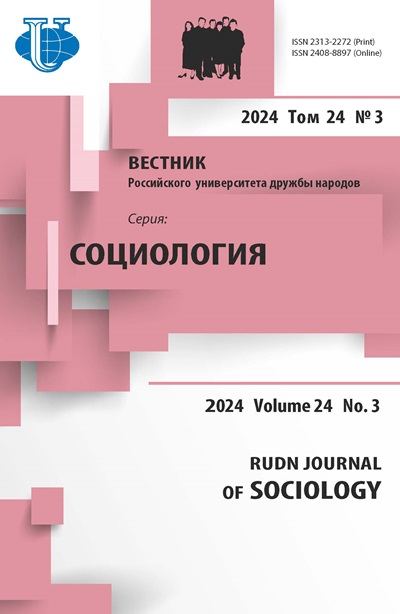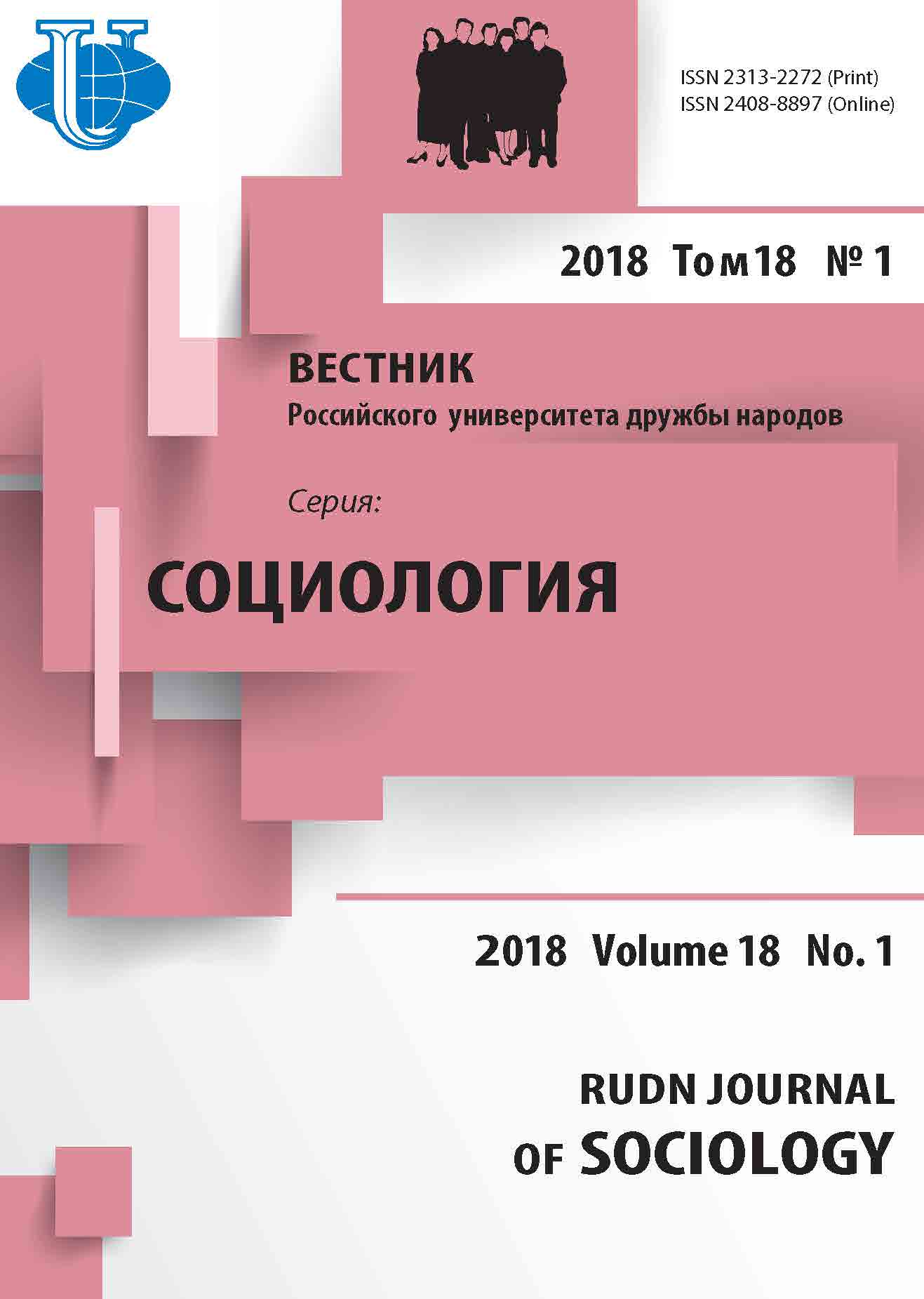THE OPPOSITION ‘WEST/NON-WEST’ IN THE SOCIAL THOUGHT: PRO ET CONTRA
- Authors: Radkevich KV1, Shabaga AV1
-
Affiliations:
- Peoples’ Friendship University of Russia (RUDN University
- Issue: Vol 18, No 1 (2018)
- Pages: 20-32
- Section: Theory, Methodology and History of Sociological Research
- URL: https://journals.rudn.ru/sociology/article/view/17823
- DOI: https://doi.org/10.22363/2313-2272-2018-18-1-20-32
Cite item
Full Text
Abstract
The article considers the phenomenon of social science debates in the form of the opposi-tion ‘West/Non-West’ and its social-political and identification consequences. The authors focus on the histo-ry of this opposition, the ways to overcome the scientific and social confrontations that were determined by it, and on the methodological significance of the concept ‘Non-Western theories’. The authors study the features of social and political knowledge of the countries of Asia, Africa and Latin America; compare social values of Western Europe, China and other countries to identify the ways for its integration in the course of postcolonial political and scientific development. In particular, the article compares the axio-logical triad of T. Heuss (democracy, Roman law, Christian ethics) and the Chinese dyad - the will of the people (minxin suoxiang) and three convents (sāngāng). Within the West/Non-West opposition, the Western European, Chinese, Japanese, Indian, African, Latin-American social-political constructs are considered to assess the productivity of some categorical oppositions and contaminations adopted in the sphere of social knowledge and to prove the theoretical inconsistency of multiculturalism. The authors also consider the issues of eurocentrism and Western-European messianism on the examples of their relation-ship with Sino-Centrism, and the ideas of African and Latin-American nationalism. Such comparisons prove the metatheoretical status of the ‘West/Non-West’ opposition that can be explained within the paradigm of the social construction of reality. The authors conclude that the concepts ‘West’ and ‘Non-West’ do not have a truly scientific status; they are rather markers of social values claiming a special identifica-tion value, i.e. having a direct relation to self-representation. The concepts ‘West’ and ‘Non-West’ are a kind of political declarations tather than an evidence of epistemological differences in the foundations of social knowledge in different parts of the globe.
About the authors
K V Radkevich
Peoples’ Friendship University of Russia (RUDN University
Author for correspondence.
Email: radkevich@rambler.ru
Miklukho-Maklaya St., 6, Moscow, Russia, 117198
A V Shabaga
Peoples’ Friendship University of Russia (RUDN University
Email: schabaga@gmail.com
Miklukho-Maklaya St., 6, Moscow, Russia, 117198
References
- Berger P.L., Luckmann T. Socialnoye konstruirovaniye realnosti. Traktat po sociologii znaniya [The Social Construction of Reality. A Treatise on Sociology of Knowledge]. Moscow; 1995 (In Russ).
- Bodin J. Metod liogkogo poznaniya istorii [Method for the Easy Comprehension of History]. Moscow; 2000 (In Russ).
- Vneshnyaya politika Rossii XIX i nachala XX veka [Foreign policy of Russia of the XIX and the beginning of the XX century]. Dokumenty Rossijskogo ministerstva inostrannyh del. Serija 1: 1801—1815. Vol. VIII. Moscow; 1972 (In Russ).
- Herodotos. Istoriya v devyati knigah [The History]. Leningrad; 1972 (In Russ).
- Ivanovsky Z.V. Bolivariansky alians dlia Ameriki: dostizheniya i trudnosti alternativnoj modeli razvitiya. Vvedenie [Bolivarian Alliance for America: Achievements and difficulties of an alternative development model. Introduction]. Integratsionnye protsessy v Latinskoj Amerike: sostoyanie i perspektivy. Moscow; 2012 (In Russ).
- Kuznetsov A.M., Kozinets A.I. Nezapadnye teorii mezhdunarodnyh otnoshenij — ot marginalnosti k priznaniyu [Non-Western theories of international relations — from marginality to recognition]. Oikumena. 2016: 4 (In Russ).
- Marx K. K kritike politicheskoj ekonomii. Predislovie [A Contribution to the Critique of Political Economy. Preface]. Sobranie sochinenij. Vol. 13. Moscow; 1959 (In Russ).
- Mahabharata. Kniga vtoraya. Sabhaparva ili kniga o sobranii [The Mahābhārata. Sabha Parva. The Book of the Assembly Hall]. Мoscow; 1992 (In Russ).
- Montesquieu Ch.L. Izbrannye proizvedeniya. O duhe zakonov [Selected Papers. The Spirit of the Laws]. Moscow; 1999. (In Russ).
- Panarin A.S. Politologiya. Zapadnaya i Vostochnaya traditsii [Political Science. Western and Eastern Traditions]. Мoscow; 2000 (In Russ).
- Piatakov A.N. Venesuela kak osnova Bolivarianskogo aliansa dlya Ameriki [Venezuela as the basis of the Bolivarian Alliance for America]. Integratsionnye processy v Latinskoj Amerike: sostoyanie i perspektivy. Moscow; 2012 (In Russ).
- Said E.W. Orientalizm. Zapadnye kontseptsii Vostoka [Orientalism. Western Concepts of the East]. Saint Petersburg; 2006 (In Russ).
- Zhao Tingyan. Sovremennyj vzglyad na kitajskuyu mechtu [Contemporary interpretation of the Chinese dream]. Mezhdunarodnye Protsessy. 2015: 13 (2) (In Russ).
- Chugrov S.V. Suschestvuet li nezapadnaya politologiya (“Politicheskaya teoriya” T. Inoguti) [Is there a Non-Western political science (T. Inoguchi’s “Political Theory”)]. Politicheskie Issledovaniya. 2016: 4 (In Russ).
- Strauss L. Klassicheskoe obrazovanie i otvetstvennost [Liberal education and responsibility]. Vvedenie v politicheskuyu filosofiyu. Moscow; 2000 (In Russ).
- Berger R. Europas Werte, Europas Wirtschaft. Frankfurter Allgemeine Zeitung. 21.07.2013.
- Dieterich H. Der Sozialismus des 21. Jahrhunderts: Wirtschaft, Gesellschaft und Demokratie nach den globalen Kapitalismus. Berlin; 2006.
- Hulin M. Hegel et l’Orient. Paris; 1979.
- Kipling J.R. The ballad of East and West. Rudyard Kipling and his World. London; 1975.
- Non-Western International Relations Theory: Perspectives on and Beyond Asia. London— New York; 2010.
- Ren Xiao. Toward a Chinese school of international relations? China and the New International Orders. New York; 2008.
- Stead W.T. The Last Will and Testament of Cecil J. Rhodes. London; 1902.














